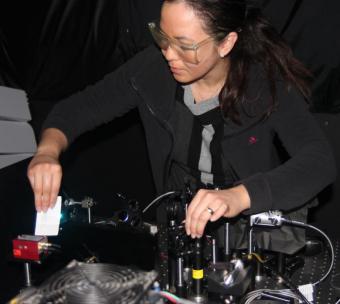Biomedical Engineer Receives Grant from Allergan
 Allergan has awarded Michelle Digman a $787,000 grant to study how a subunit of botulinum neuro-toxin affects cells and tissue on a molecular level. An assistant professor of biomedical engineering, Digman’s research expertise involves using optical microscopy tools to track molecules and microscopic particles in living cells and tissues. She is a co-investigator of UC Irvine’s Laboratory for Fluorescence Dynamics, an NIH Biotechnology Resource for the development of fluorescence microscopy.
Allergan has awarded Michelle Digman a $787,000 grant to study how a subunit of botulinum neuro-toxin affects cells and tissue on a molecular level. An assistant professor of biomedical engineering, Digman’s research expertise involves using optical microscopy tools to track molecules and microscopic particles in living cells and tissues. She is a co-investigator of UC Irvine’s Laboratory for Fluorescence Dynamics, an NIH Biotechnology Resource for the development of fluorescence microscopy.
With this grant, she will be using fluorescent imaging to track the transport and diffusion of the toxin in living cells, to better understand any biochemical and physiological changes that occur. She will also study metabolic changes in tissue at the point of injection.
“Botulinum neuro-toxin is used in a variety of clinical treatments including neuromuscular diseases, epilepsy and pain-related illnesses,” says Digman. “This study is important on a clinical level and will provide valuable information in the development of future therapies for pain-related disorders.”
Allergan, Inc. is a multi-specialty health care company focused on discovering, developing and commercializing innovative pharmaceuticals, biologics, medical devices and over-the-counter consumer products that enable people to live life to its greatest potential — to see more clearly, move more freely, express themselves more fully.
